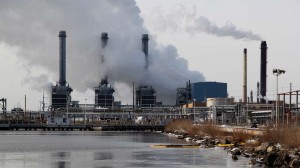DEP issues permits to Shell for possible ethane cracker
-
Jon Hurdle

Emma Lee / WHYY
Opponents of a possible ethane cracker in Beaver County worry that it will harm air quality, a claim that was rejected by DEP.
Shell Chemical moved a step closer to the possible construction of a major petrochemical plant in western Pennsylvania on Friday when it received four permits for air quality and water management from the state’s Department of Environmental Protection.
Four years after announcing it was considering building the multi-billion-dollar plant in Beaver County about 25 miles north of Pittsburgh, the Dutch oil giant still hasn’t decided whether to go ahead with the project, which would include an ethane cracker, but it called the permit issuance an important step in its evaluation process.
“The receipt of the air permit is a critical milestone for the project, and we are pleased that we continue to make progress in our project evaluation,” the company said in a statement.
“However, it does not mean we have made a final decision to build the project; we will make that decision when our full project evaluation is complete. This permit is a necessary step that allows Shell to proceed with some preliminary site-development work,” the statement said.
The DEP said in a report on air quality that Shell’s plans indicate that it would not violate any of the National Ambient Air Quality Standards.
In a 69-page document, the department responded to 45 comments from statewide environmental groups; local officials and residents, and energy industry representatives.
Its responses included a rejection of a claim by Joe Osborne, legal director of Group Against Smog and Pollution, that Shell had used outdated meteorological data from 2006-10 in modeling the air emissions of the proposed complex. The DEP said the data were the most recently available at the time of its analysis.
And it dismissed a claim by Mack Flood, business development manager at McCutcheon Enterprises, a waste management company, that a cracker plant would increase the risk of local women and girls getting breast cancer.
The DEP said that a study that formed the basis of Mack’s comment addressed a range of environmental conditions that had a causal relationship with breast cancer but that those conditions did not include an ethane cracker, and the study was therefore not appropriate to evaluate the potential health risk of the plant.
At the same time, Shell received permits for storm-water discharge; for water obstruction, and for storm-water discharge associated with construction at a stream and wetland mitigation site.
There are three other permits — on submerged lands; land recycling, and historical and archaeological issues — that have been finalized or are close to being so, said John Poister, the DEP’s community affairs coordinator.
And further permits will be needed if the project goes ahead but it is too early to speculate on what those permits might be or when they would be issued, Poister said.
Shell announced in June 2011 that it was considering the site for a possible ethane cracker – which would make ethylene, a component of plastics and other materials — because of its proximity to liquids-rich natural gas from the Marcellus Shale, and its good transportation links.
The site was chosen over several competing locations in other states after Pennsylvania officials under former Gov. Tom Corbett offered Shell $66 million a year in tax breaks. The company has said the project would create some 10,000 jobs at the peak of construction and around 400 permanent positions.
*An earlier version of this story incorrectly attributed comments to Ken Zapinksi, senior vice president of the Allegheny Conference on Community Development. The comments have been deleted from the updated version.
















